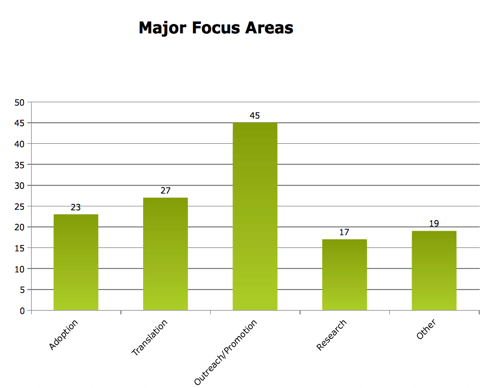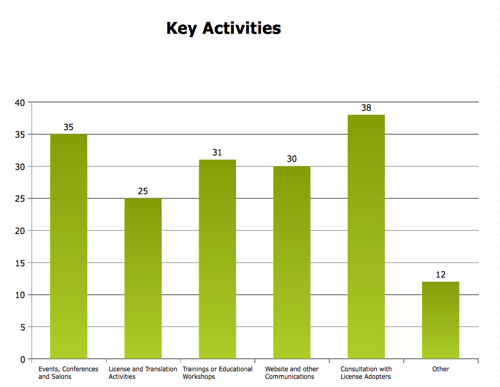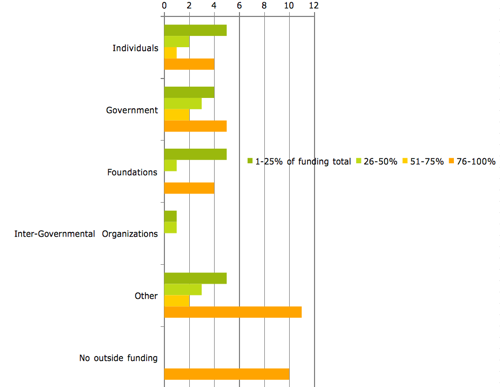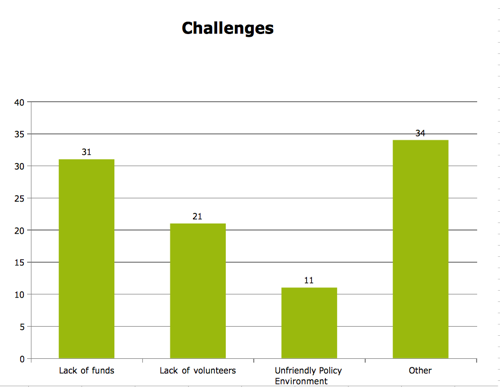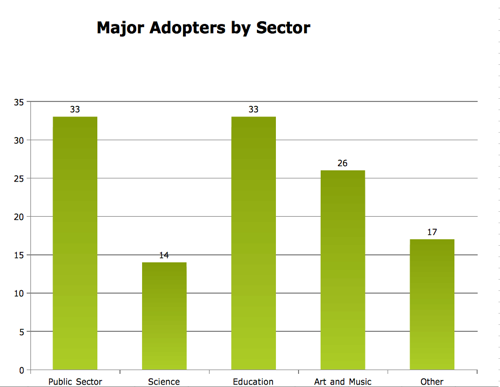Affiliate Reporting/2010
CC Affiliate Network -- 2010 Report
Contents
Information about our Affiliate Network
This Report contains information submitted by official CC affiliates in response to a 2010 year-end survey. This is the second time that CC-HQ has requested information about affiliates and their activities. The first survey was conducted in early Spring 2010, and reports generated on a voluntary basis. This resulted in a low response rate. The survey used to compile this Report solicited responses from affiliates in 75 jurisdictions. CC received responses from affiliates in 52 of those jurisdictions.
Annual reporting by CC affiliates is required under the new affiliate network structure. Future surveys and resulting reports will contain additional, more detailed information, of use to CC as well as the affiliates.[1] For reference, from early 2010 to the first quarter of 2011, seven new Affiliate teams are expected to join the network.
Affiliate Supplied Information
Data note: for most questions, affiliates were given the ability to select more than one answer; therefore, totals exceed number of jurisdictions reporting (i.e., 52). A list of respondents is included below.
Team Information
Team size varies from one to over 50 individuals. Total, CC has more than 400 volunteers around the world participating on official CC affiliate teams. Many of the teams consist of about 10 people.
Focus Areas
In 2010, affiliate teams focused most on outreach and promotion of Creative Commons. Nearly every team did some sort of outreach or promotion during 2010.
Key Activities
The most common activities conducted by affiliates in 2010 were consulting with prospective license users and organizing conference and salon events. Affiliates also spent a large amount of time working on license porting and translation activities.
Funding
Many teams are supported solely by their respective affiliate institutions. For those that do receive outside funding, law firms, for-profit corporations, and revenue gained from workshops provide the main sources of revenue.
Challenges
Affiliate teams not only shared their most common challenges, but also ideas for overcoming these challenges. In addition to the common challenges identified below, challenges in the Other category include confusion and lack of clarity around license terms and license proliferation by others. Proposed solutions suggested improving the FAQ on the CC website and increasingly emphasizing license compatibility.
Ideas for Improving/Addressing Challenges
In General (largely unedited):
- Increase information about CC in mainstream media
- Find people who want to advocate for CC and let them do it their way
- Show that culture and the culture of sharing is vital for the development, and for the peace and balance, of any society
- Change focus of CC HQ from a legalist mindset towards more practical issues
- Focus on problems within free culture, instead of noncritical hype and idolization of CC and the few well known use cases
- Think about how to improve copyright law, not just take it as a given
- Act as a global movement
- More media coverage
- Less bureaucracy, especially the porting process
Lack of funds
- Better fundraising strategy, expected to come from the new affiliate structure
- Fundraising events
- Applications for funds
- Support from CC for funding proposals, including recommendations of potential donors
- CC HQ should provide funding each year to teams
- Cooperation with major CC adopters and sympathizers
- Seek sponsors
Lack of Volunteers
- Begin dedicated educational program training of advocates for openness
- Find more people who can contribute in new ways
- Hold workshops to increase awareness of CC and find new volunteers there
- Recruit at lectures and through fliers
- Use student policy fellows
- Provide more education about CC to the public, especially young lawyers, professionals and researchers
- Recruit affiliate marketing volunteers
Unfriendly Policy Environment
- Promote projects between European countries
- Having CC be more active in the Open Access Movement
- Don't be religious about open licensing
- Find hidden shortcuts into position papers
- Change the laws around collecting societies
Adoption
Highlights of New Major Adopters
Europe
- Prime Minister of Greece
- Orange (mobilcom) Foundation in Poland
- President of Portugal
- Dutch government
- Ministry of Telecommunications and Information Society of Republic of Serbia
- Israel Ministry of Foreign Affairs
- Georgia Ministry of Education and Science
Asia
- Taiwan Public Television Service Foundation
- New Zealand government
- Macedonia Center for Research and Policy Making
- Australian Treasury
Middle East
- Al-Akhbar Lebanese newspaper
South America
- The Canaima Project in Venezuela (gives out laptops already loaded with CC-licensed educational resources)
- University of Puerto Rico
- Brazil Ministry of Justice
New Major Adopters by Sector
Other Comments from the Affiliates (unedited)
- Very excited about the upcoming global meeting
- Would like clarification on incorporating as a non-profit while still respecting trademark policy
- Would like more reminders to report progress
- Nordic country CC teams are working on an international book project to highlight business models in free culture
- Would like an increase in conversations, especially across regions
- Stop referring to the Affiliate Teams as jurisdictions and stop asking for reports
- Lots of books and music are being released under CC licenses in Lebanon
- Include sui generis rights in the licenses
- CC New Zealand has found the establishment of a special CC panel with members form a range of sectors very helpful
- Develop a clear long-term funding model for CC and its affiliates, possibly through the use of Richard Florida’s Creative Class concept
- CC Australia ran a successful Creative Commons Roadshow that toured Australia and provided detailed information about CC licenses
Respondents
The 2010 Affiliate Report is based on completed surveys from the following jurisdictions. Thanks to everyone who submitted a report!
- Armenia
- Australia
- Azerbaijan
- Brazil
- Bulgaria
- Chile
- China Mainland
- Costa Rica
- Croatia
- Czech Republic
- Denmark
- Ecuador
- Egypt
- Finland
- Finland
- France
- Georgia
- Germany
- Greece
- Guatemala
- Hong Kong S.A.R.
- Hungary
- Iceland
- Indonesia
- Israel
- Italy
- Japan
- Lebanon
- Macedonia
- Netherlands
- New Zealand
- Norway
- Peru
- Poland
- Portugal
- Puerto Rico
- Romania
- Serbia
- Singapore
- Slovakia
- Slovenia
- South Korea
- Spain
- Sweden
- Switerzland
- Syria
- Taiwan
- Thailand
- UK
- Ukraine
- Venezuela
- ↑ The 2010 Annual Survey was abbreviated due to work product commitments of affiliates necessary to complete the affiliate enhancement process. These other activities included the preparation of roadmaps for activities in 2011, and reviewing and completing new memoranda of understandings. Staff anticipates the restructuring to be completed in full by late January//early February 2011.
